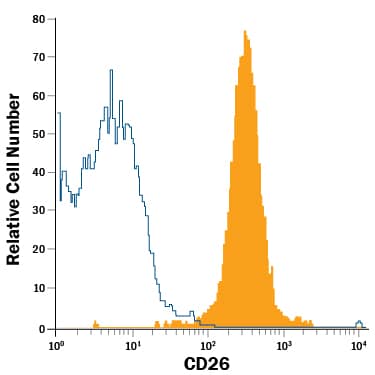DPPIV/CD26 Antibody (155202) [PE]
Novus Biologicals, part of Bio-Techne | Catalog # FAB9541P

Key Product Details
Species Reactivity
Applications
Label
Antibody Source
Concentration
Product Specifications
Immunogen
Extracellular domain
Specificity
Clonality
Host
Isotype
Scientific Data Images for DPPIV/CD26 Antibody (155202) [PE]
Detection of DPPIV/CD26 in Mouse Thymocytes by Flow Cytometry.
Mouse thymocytes were stained with Rat Anti-Mouse DPPIV/CD26 PE-conjugated Monoclonal Antibody (Catalog # FAB9541P, filled histogram) or isotype control antibody (Catalog # IC006P, open histogram). View our protocol for Staining Membrane-associated Proteins.Applications for DPPIV/CD26 Antibody (155202) [PE]
Flow Cytometry
Sample: See below
Formulation, Preparation, and Storage
Purification
Formulation
Preservative
Concentration
Shipping
Stability & Storage
Background: DPPIV/CD26
DPPIV/CD26 (EC 3.4.14.5) is a serine exopeptidase that releases Xaa-Pro dipeptides from the N-terminus of oligo- and polypeptides (1, 2). It is a type II membrane protein consisting of a short cytoplasmic tail, a transmembrane domain, and a long extracellular domain (3‑5). The extracellular domain contains glycosylation sites, a cysteine-rich region and the catalytic active site (Ser, Asp and His charge relay system). The amino acid sequence of the mouse DPPIV/CD26 extracellular domain is 84% and 91% identical to the human and rat counterparts, respectively. In the native state, DPPIV/CD26 is present as both a monomer and a noncovalently linked homodimer on the cell surface, the latter configuration being necessary for optimal activity. A soluble form is also detectable in human serum and other body fluids, the levels of which may have clinical significance in patients with cancer, liver and kidney disease, and depression. DPPIV/CD26 plays an important role in many biological and pathological processes. It functions as T cell-activating molecule (THAM). It serves as a co‑factor for entry of HIV in CD4+ cells (6). It binds adenosine deaminase, the deficiency of which causes severe combined immunodeficiency disease in humans (7). It cleaves chemokines such as stromal-cell-derived factor 1 alpha and macrophage-derived chemokine (8, 9). It degrades peptide hormones such as glucagon (10). It truncates procalcitonin, a marker for systemic bacterial infections with elevated levels detected in patients with thermal injury, sepsis and severe infection, and in children with bacterial meningitis (11).
References
- Misumi, Y. and Y. Ikehara (2004) in Handbook of Proteolytic Enzymes. Barrett, A.J. et al. (eds), p. 1905, Elsevier, London.
- Ikehara, Y. et al. (1994) Methods Enzymol. 244:215.
- Marguet, D. et al. (1992) J. Biol. Chem. 267:2200.
- Bernard, A.M. et al. (1994) Biochemistry 33:15204.
- Vivier, I. et al. (1991) J. Immunol. 147:447.
- Callebaut, C. et al. (1993) Science 262:2045.
- Kameoka, J. et al. (1993) Science 261:466.
- Ohtsuki, T. et al. (1998) FEBS Lett. 431:236.
- Proost, P. et al. (1999) J. Biol. Chem. 274:3988.
- Hinke, S.A. et al. (2000) J. Biol. Chem. 275:3827.
- Wrenger, S. et al. (2000) FEBS Lett. 466:155.
Long Name
Alternate Names
Gene Symbol
Additional DPPIV/CD26 Products
Product Documents for DPPIV/CD26 Antibody (155202) [PE]
Product Specific Notices for DPPIV/CD26 Antibody (155202) [PE]
This product is for research use only and is not approved for use in humans or in clinical diagnosis. Primary Antibodies are guaranteed for 1 year from date of receipt.
